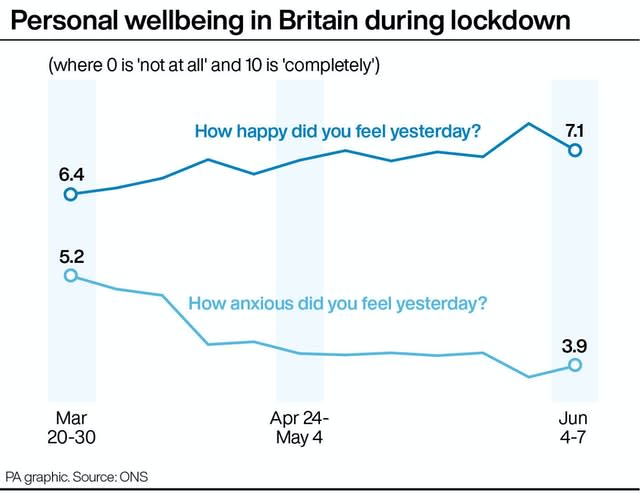One in four thinks normal life may take over a year to return – if at all
Nearly one in four people thinks it may take more than a year for their life to return to normal – or that it may never happen at all, a study has found.
Some 24.6% expect things will take more than a year or will never return to normal, the Office for National Statistics (ONS) said.
It added that the longer the coronavirus pandemic has continued, the longer people think life will take to get back to normal, if at all.

It found that while levels of anxiety have decreased, so have levels of life satisfaction.
There are also signs of growing economic inequality as the pandemic has affected the lives of some more than others.
An estimated 12.5 million people say their households have been affected financially by coronavirus, a similar share compared with the start of lockdown, the report found.
Overall, economic and financial expectations have fallen to levels not seen since 2008, according to the ONS, which produced the figures to shed light on the impact of the pandemic on people and households across Britain.
As average anxiety has fallen, the time we think it will take for things to return to normal has increased and 1 in 4 of us now expect it will take over a year or will never go back to normal https://t.co/O2RFczWOjF pic.twitter.com/iRy8iW8pkA
— Office for National Statistics (ONS) (@ONS) June 18, 2020
Expectations for the general economic situation fell particularly sharply between the period before lockdown in March and April, and then fell further in May.
Expectations for their financial situation remain slightly more positive than at the height of the 2008 recession, the ONS said.
In evidence of growing economic inequality, 26% of those on lower personal incomes, between £10,000 and £20,000, have experienced a worsening in finances, and were less able to save for the year ahead than those on higher incomes.
People on personal incomes of £40,000-plus saw fewer impacts and were much more able to cover unexpected expenses than they were earlier in lockdown, the report found.
Parents, the self-employed, people on lower incomes, the lonely and those who felt unsafe in the home reported the biggest impacts in terms of their personal and economic wellbeing.

Parents were worse hit than adults without children in the house, according to the findings.
They were around twice as likely to report reduced income or to have been furloughed, and fewer than half were able to cover a necessary expense as more than 20% of them found childcare had an impact on their work.
Home schooling was found to negatively affect lower income families’ wellbeing.
In terms of anxiety levels, there have been some improvements, the ONS said.
Anxiety has reduced from a peak of 5.2 out of 10 in the week ending March 30 to 3.9 in the week ending June 7.
Some measures, such as furloughing and mortgage relief, as well as increased community support and clapping for the NHS, carers and other key workers may have helped to stabilise anxiety levels, the report said.
But people’s assessments of their life satisfaction and the feeling that what they do is worthwhile have continued to fall since March 20 – and are at much lower levels than before the pandemic, the report said.

 Yahoo Finance
Yahoo Finance 